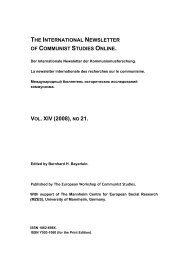11RXNdQ
11RXNdQ
11RXNdQ
Create successful ePaper yourself
Turn your PDF publications into a flip-book with our unique Google optimized e-Paper software.
The Frogs Who Demand a King* 51<br />
checking, helping and challenging each other: they do not believe in Santa Claus<br />
anymore. What, then, have they got to do with the Great One? Why, when it comes to the<br />
State, should they place their trust in this infallible prince rather than in technical<br />
organizations which they could keep a check on? It must be because the very figure of<br />
General de Gaulle silently offers the slightly blurred image of a policy. And, above all, in<br />
order to decipher this image, these republicans must have a particular idea of France, of<br />
the Republic, of the world and of themselves. If we could, on the strength of innumerable<br />
surveys, statements and private conversations, determine the characteristics and thoughts<br />
of these perfectly honest and basically democratic electors who will vote ‘yes’ next<br />
Sunday, we would see, I think, that they too are victims of a mirage. And if they happen<br />
to see this sketch, some of them will perhaps recognize themselves, and perhaps have<br />
their eyes opened.<br />
We must get away from the wretched Fourth Republic that has just fallen apart from<br />
self-loathing. There is nothing new about the reproaches levelled at it: they were levelled<br />
before at the Third Republic, which, on 6 February 1934, thought it was going die from<br />
them. At that time, they were less virulent and less unanimous: scarcely less justified.<br />
The fact is that, since 1947, the regime has lost its grip on reality, the fact is that the<br />
Assembly was cut off from the people, that is to say the electors; the fact is that there was<br />
a ‘system’, in other words our politicians had become inert objects and obeyed inflexible<br />
laws similar to those which govern the course of things. What stood out at first sight was<br />
ministerial instability. The sudden, sometimes unexpected falls, the long crises were, for<br />
many French people, the very image of disorder. In fact, there was never more than one<br />
government. Stable, but rotating. The – limited – team of potential ministers danced in a<br />
circle, each holding his neighbour by the hand while waiting for the revolving spotlight to<br />
pick him out of the shadows. It is possible that a few close friends of M. Pflimlin and M.<br />
Schumann could tell them apart, but politically, they elude the principle of individuation.<br />
Supported by the same majority, the newcomers continued the policies of their<br />
predecessors, in other words, persisted in their inertia.<br />
During this entire period, a single tear in the fabric was mended fast, the Mendès-<br />
France government. This upstart was not one of the gang: they certainly let him know it.<br />
All right. This description has been given a hundred times before. The system is<br />
impotence in power. Not anarchy – where people do what they like – but paralysis, where<br />
the brain continues to think but the limbs can no longer move. Yes, M. Gaillard and M.<br />
Pinay had something resembling a head, and that head told them – they made no mystery<br />
of this in private – that the Algerian War was absurd and negotiations had to take place.<br />
But when M. Gaillard did his stint of guard duty as prime minister, he was not crazy<br />
enough to imagine his new post had been entrusted to him so that he could do what he<br />
believed to be useful and just, to proclaim what he believed to be true. This<br />
interchangeable prime minister lent his voice to the system, and via his mouth, the system<br />
declared: to govern is not to foresee, or to prevent, or to choose, to govern is to obey; we<br />
shall continue all-out war.<br />
The spectacle of impotence does not swell the heart with joy. It makes those who work<br />
indignant because work is action.<br />
What proves pretty well that anti-parliamentarianism here is of professional origin is<br />
that one hears members of parliament being reproached less for their impotence or their




